On March 8, 2017, Gilles Mongeau, S.J., an Associate Professor of Systematic Theology at the Jesuit’s Regis College in Toronto, gave a lecture describing the history of, and his involvement with, the gay-affirmative outreach of All Inclusive Ministries (AIM). Located in the Archdiocese of Toronto, at Our Lady of Lourdes Parish, AIM is a dissident group that traces its origins back to the pro-gay marriage Dignity ministry. According to the “Vision” of AIM: “We envision a time when all the children of God participate fully in all aspects of life within the Church and society.”
Dignity was founded in 1969 by Fr. Patrick Nidorf in San Diego, California; in 1970, Dignity drafted their first “Statement of Purpose” which relied heavily on the theories expounded by John J. McNeill, S.J., which included, among other things, “that homosexuality is a natural variation on the use of sex. It implies no sickness or immorality. Those with such sexual orientation have a natural right to use their power of sex in a way that is both responsible and fulfilling…and should use it with a sense of pride.” Although Nidorf initially had permission from his superiors in the Archdiocese of Los Angeles to form this ministry, he was silenced in 1971 by then-Archbishop Timothy Manning. Despite this, the group continued to grow with the help of sympathetic priests who often served as chaplains; with Dignity meetings taking place in various local parishes throughout the country. Even prominent bishops continued to publicly support them; in 1983 Archbishop Raymond G. Hunthausen of Seattle, celebrated Mass at the city’s Cathedral for 1000 Dignity members during their annual convention.
Part of the Dignity “Statement of Position and Purpose” (adopted in 1985) includes the following: “As members of Dignity, we are Christ’s disciples, a lesbian and gay People of God in the Body of Christ, part of the Catholic tradition. Our sexuality is God’s holy gift to us. In it, and in our genital activity, we want to meet our God.” Following the Obergefell decision, Dignity called on the Catholic Church to recognize the “Sacramental Equality” of same-sex marriages.
In 1986, in an effort to finally defeat the growing influence of pro-gay advocacy groups within the Church, the Vatican released a stinging Letter to the Bishops on the Pastoral Care of Homosexual Persons; although no particular group was mentioned, Dignity certainly fit the parameters of a questionable apostolate:
…this Congregation wishes to ask the Bishops to be especially cautious of any programs which may seek to pressure the Church to change her teaching, even while claiming not to do so. A careful examination of their public statements and the activities they promote reveals a studied ambiguity by which they attempt to mislead the pastors and the faithful. For example, they may present the teaching of the Magisterium, but only as if it were an optional source for the formation of one’s conscience. Its specific authority is not recognized. Some of these groups will use the word “Catholic” to describe either the organization or its intended members, yet they do not defend and promote the teaching of the Magisterium; indeed, they even openly attack it.
The immediate effect of the Letter was the decision by several American bishops to order that Dignity no longer be allowed to hold meetings at Catholic parishes; the secondary effect of the Letter was the necessity for many “gay” friendly parishes, or Catholic gay affirming ministries, to superficially rearrange their prospective organizations, remove any implicit support of Dignity, become less politically active, while still maintaining the same set of core beliefs; probably the three most flagrant examples are Most Holy Redeemer Parish in San Francisco and St. Paul the Apostle Church in New York City as well as the “official” Archdiocese of Los Angeles outreach to those with same sex-attraction: The Catholic Ministry with Lesbian and Gay Persons; but, there are gay-affirming parishes in almost every major city within the United States as evidenced by a list of gay-friendly parishes maintained by New Way Ministry. There are also gay-affirmative Jesuit parishes in Seattle and San Francisco; the well-known Jesuit Donal Godfrey claims that God is transgender.
In his talk, Mongeau describes the efforts by one Bishop to essentially circumvent the Vatican directives:
The Bishops certainly in North America decided that the group known as Dignity could no longer meet on Catholic Church premises. The Archbishop of Toronto at the time, Cardinal Carter, went along with the decision of his peers, but wrote a letter to the pastor of Our Lady of Lourdes, the Jesuit Pastor…asking the Pastor to welcome Dignity for their meetings on parish premises….I think the letter says something like: “in a discrete fashion” or something like that…The idea was we don’t want to cut our ties, we want to continue to minister to this group, but it has to be done in a way that will not publicly contradict the decision I’ve made.
According to Mongeau, the “antecedent” or “ancestors” to AIM were Dignity, the Soho Gay Mass in London, England, and AGLO. Mongeau described the Soho Gay Masses, along with AIM, as part of “a new ferment in the Roman Catholic Church.” Yet, in 2013, the Archbishop of Westminster forbade the continuation of the Masses which had taken place for the preceding six years at Our Lady of the Assumption Church in the Soho District of London. According to Mongeau, the Masses have continued at the Jesuit Church of the Immaculate Conception in London.
The other ancestor of AIM is AGLO – The Archdiocesan Gay and Lesbian Outreach of Chicago:
AGLO was founded by the late Cardinal Bernadin and Jerry McEnany, the leader of Dignity Chicago, after the 1987 Letter to the Catholics Bishops of the Catholic Church on the Pastoral Care of Homosexual Persons, which plainly demanded that Bishops remove gay-affirmative ministries from their parishes. According to gay-activist Rick Garcia, AGLO was a compromise between Dignity and the Archdiocese:
Cardinal Bernardin, along with as other Catholic bishops, was under great pressure from Rome to get rid of Dignity chapters on church property. Jerry and the board of directors of Dignity were meeting with the archdiocese to find a way to have it both ways—Mass on Church property for gay people and the archdiocese wanting to alleviate pressure from Rome and right-wing Catholics.
Mongeau describes how AIM as well as AGLO: “focuses on creating a space for spiritual conversation rooted in experience to help discern how Christ is at work in the lives of not just LGBTQ Catholic individuals, but in the community.”
This near-fanatical reverence for the “experience” of the LGBT community over Scripture or Tradition is a common thread running through most gay-affirmative ministries. For example, Fr. Michael Holleran in the Archdiocese of New York described a meeting between a Catholic Bishop and a “gay couple;” as he related the story, Holleran said that, afterwards, the Bishop remarked: “…how can we call people like that objectively disordered?” Holleran concluded: “what transforms hearts is when you really actually do hear people’s experience.”
Gay Catholic advocate Arthur Fitzmarurice, concerning his displeasure over the way several US bishops reacted to the Obergefell decision, wrote:
If the church hierarchy wants to witness the Spirit alive in LGBT people, it needs to listen to our stories of finding new life — and deeper relationship with God — as we strive to integrate our faith and sexuality. Until they all listen, they cannot hear the voice of God speaking through us, and their words will lack true respect, compassion and sensitivity.
From the gay-affirmative documentary “Owning Our Faith,” which was sponsored by the Out at St Paul ministry located at St. Paul the Apostle Church in New York, a same-sex married man said:
If we leave it, if we abandon the Church then it’s never going to change. So we have to continue living here, being an example and encouraging other people to be that example because that’s what’s going to change the Church.
One of the leaders at AIM is Jose Sanchez; in 2015 he wrote a piece for AIM titled LGBT & Christians: The Problem With “Loving The Sinner.” According to Sanchez, the following is what you should NOT say to a Catholic experiencing same-sex attraction:
“I love you, but you know that acting upon your same-sex attraction is a sin, right?”, “I love you but the Bible says same-sex acts are wrong”, “I love you but God has a better plan for you…”
He considers such responses as examples of a “destructive message.” Instead, he writes: “Loving means starting a dialogue with our LGBT brothers and sisters, listening to their stories, getting to know them, acknowledging the good in their lives as a whole.”
In 2015, via his Facebook page, Sanchez paid tribute to the legalization of same-sex marriage in Latin America and the USA.
In 2017, Mongeau publicly supported the Canadian transgender Bill C-16 which would make it a criminal offence to spread hate propaganda based on gender identity or expression; opponents of the overly broad Bill argued that the new law could limit free-speech; or be used against those who express religious objections to the normalization of gender dysphoria.
On August 23, 2016, AIM shared the following to their official Facebook page:
There are those whose theological project will always be to prove that gay love is something other than love. That proof can never be had. Gay love is love, and if Jesus was correct that the law is summed up in love, then homosexuality is hardly unbiblical. And if the end of natural law is to love rightly and fiercely, homosexuality is hardly immoral or unethical.
On September 20, 2016, AIM posted the following to their Facebook page:
“Homosexuality is one of God’s most significant gifts to humanity. To be gay or lesbian is to have received a special blessing from God. All humans receive their own special graces from their creator, but God has chosen some to be gay and lesbian as a way of revealing something about God-self that heterosexuals do not.”
“Just as God has given a certain gift to priests, brothers or sisters in religious life to follow the gospel with a certain public character, so God has given to gay men or lesbian women a special sexual gift which shows forth the diversity and beauty of God in our world in a public way. All creatures of God show forth God’s handiwork, but the world also needs variation so that the richness of this handiwork is made unmistakably evident. God gives gays and lesbians the rather startling variation of their sexuality to help their brothers and sisters have greater insights into the reality of their God.”
“Fully human living, finding its perfection in God, has always been at the heart of Christianity…. It would be a contradiction for the churches to teach an incarnational spirituality where sexuality grounds our very capacity to love God, and then ask the homosexual to be in effect ‘a-sexual.’ Here the invitation to the churches is surely one of theological articulation and rearticulation, but perhaps the even greater challenge is that a significant change of thinking is taking place among their members often at variance with official teaching. At a time of such testing we need to listen to all in the churches to discern the voice of God. It is not beyond the workings of God that our gay and lesbian brothers and sisters are teaching us something about God in the flesh and how to live under the cross.”’
“Today, there is a renewal of a more creation-centered spirituality. This is a name which covers a broad spectrum of spiritualities, whether that of Augustine or of Matthew Fox. We are in the midst of this change and part of it is the reintroduction of sexuality to spirituality. Not all is clear. Mistakes have been and will be made. But gays and lesbians must be part of this wedding of spirituality and sexuality. They can benefit from it by allowing themselves to find their sexuality as a way to God. They can contribute to it by bringing to the heterosexual world an experience of God that only they can have. It is a perspective and experience needed for the full epiphany of God to take place in our time. God has created gays and lesbians for this purpose and entrusted them with this mission.”
— Selections from James L. Empereur, S.J., Spiritual Direction and the Gay Person (New York: The Continuum Publishing Company, 1999), 1, 2-3, 7-8.
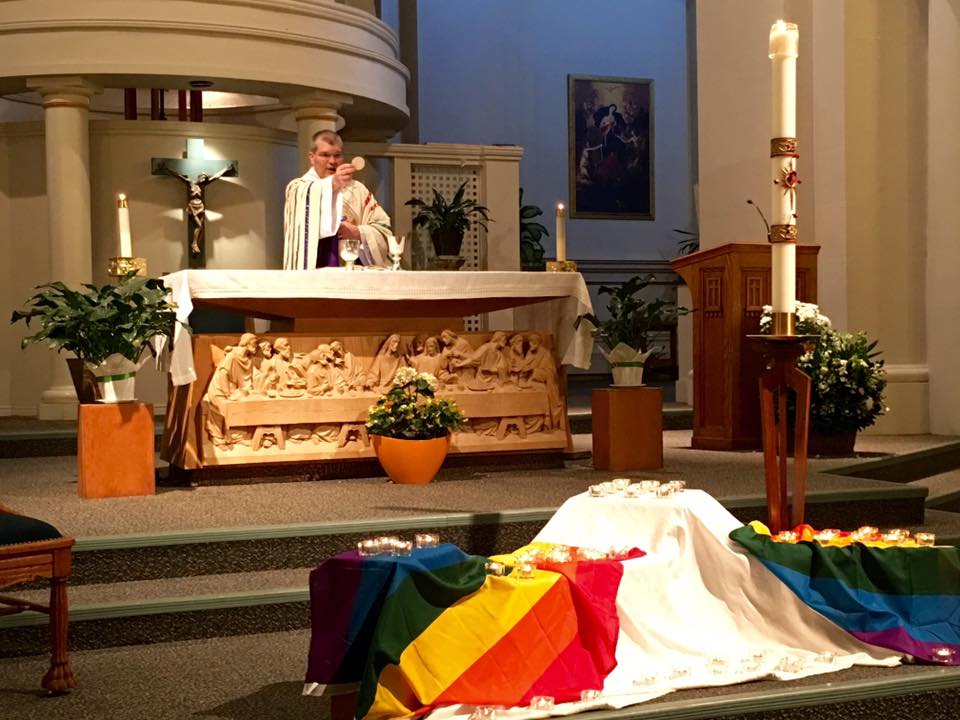

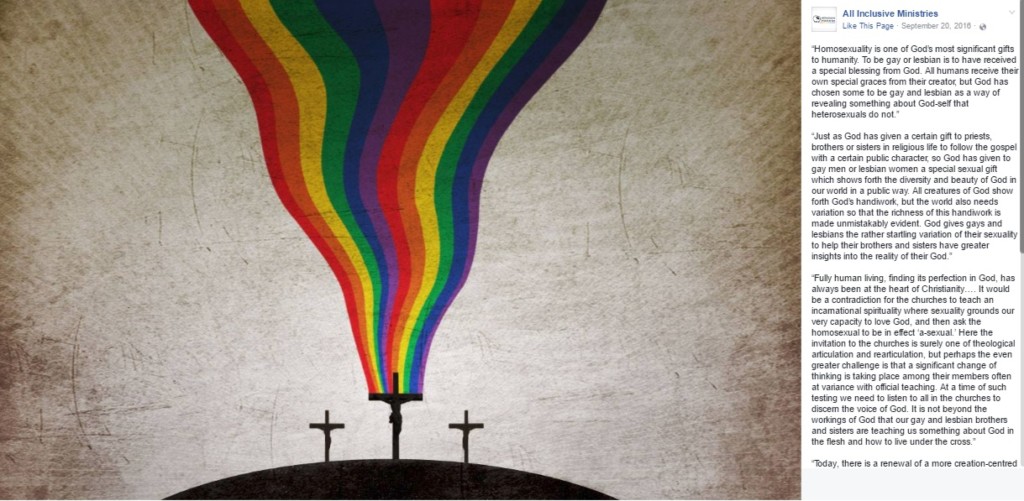

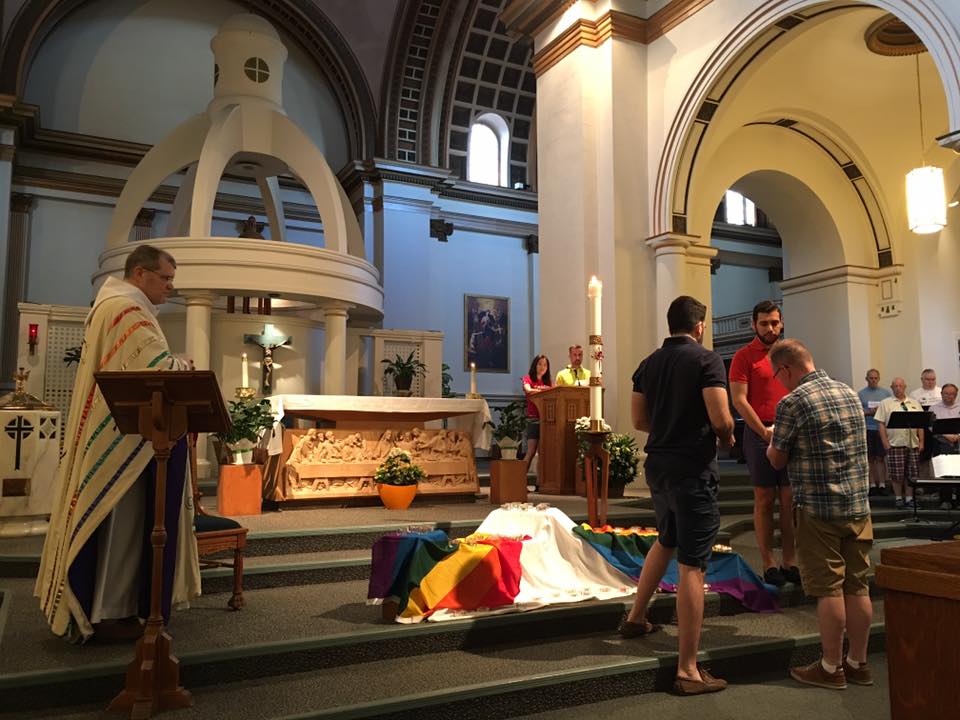
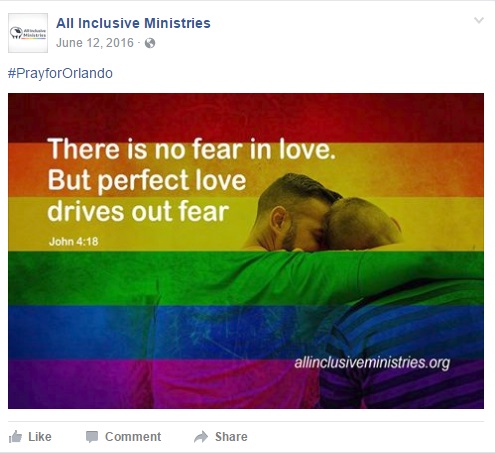
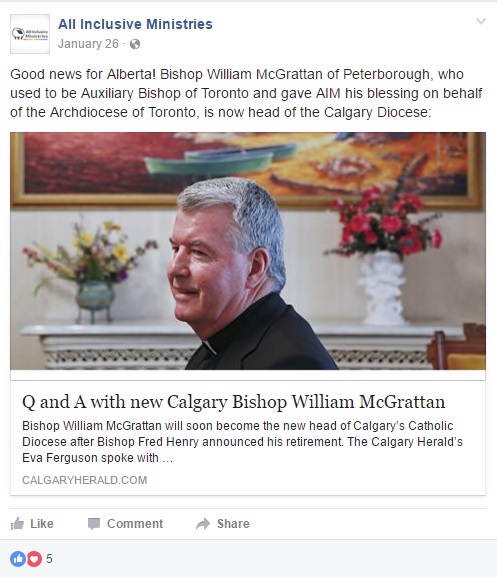
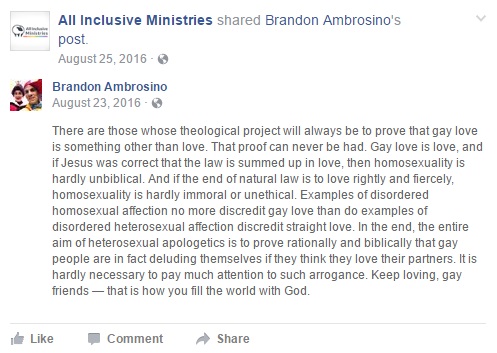

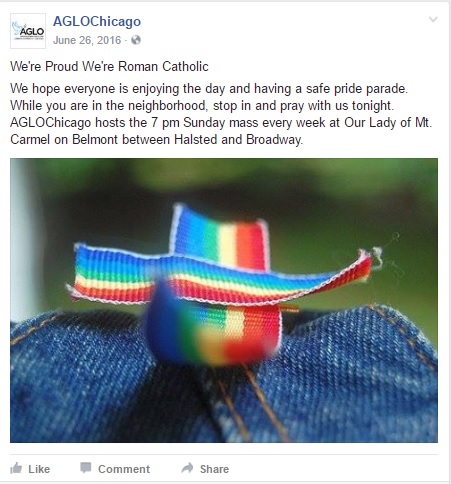
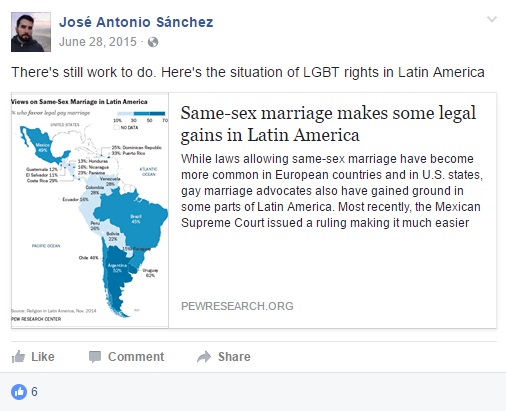
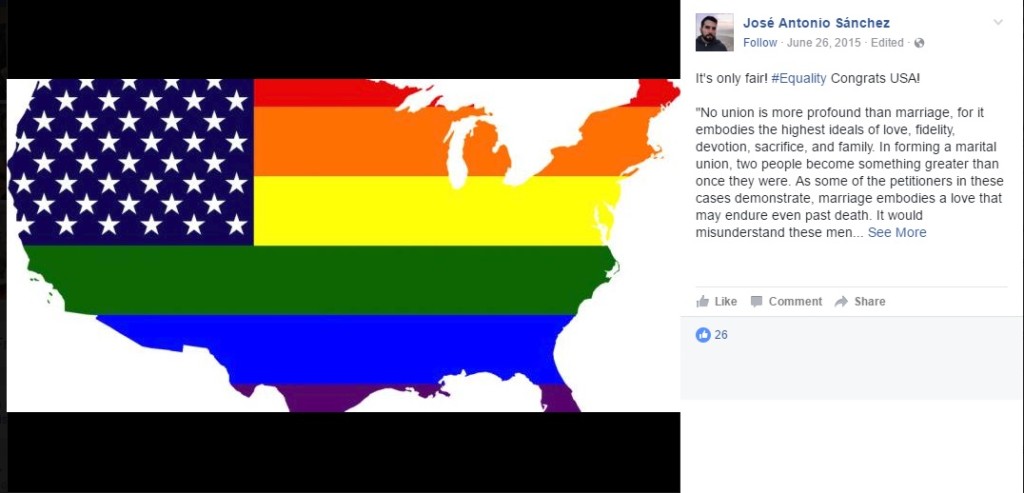
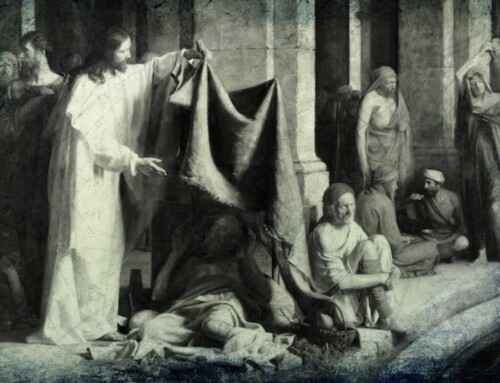
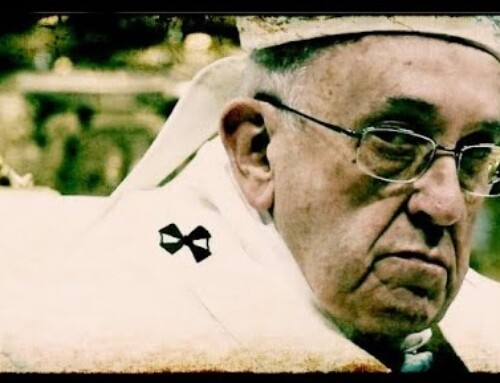
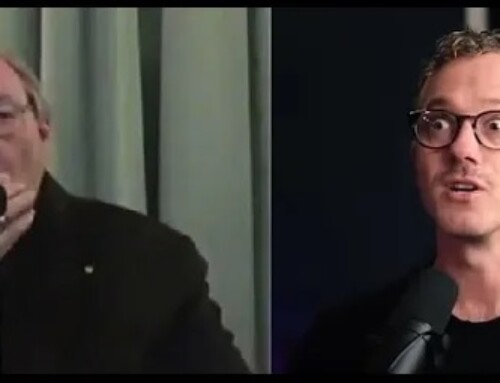
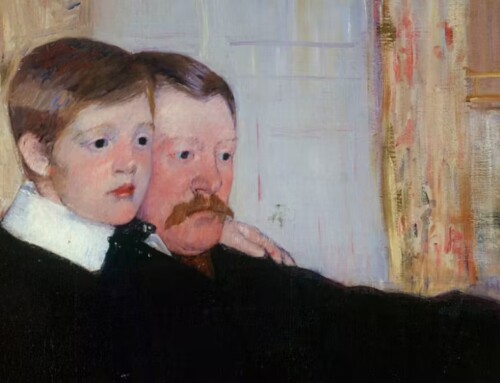
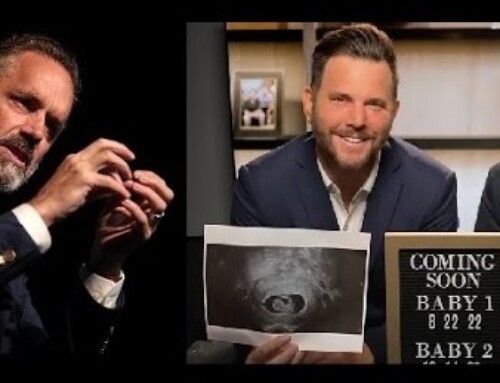
Satan asked Adam and Eve–“Did God really tell you…?” Adam and Eve knew the answer to that question– and sinned. Down through the centuries the devil asks us the same damning question and many, many of us eat the forbidden fruit with joy and glee and to our own disaster.